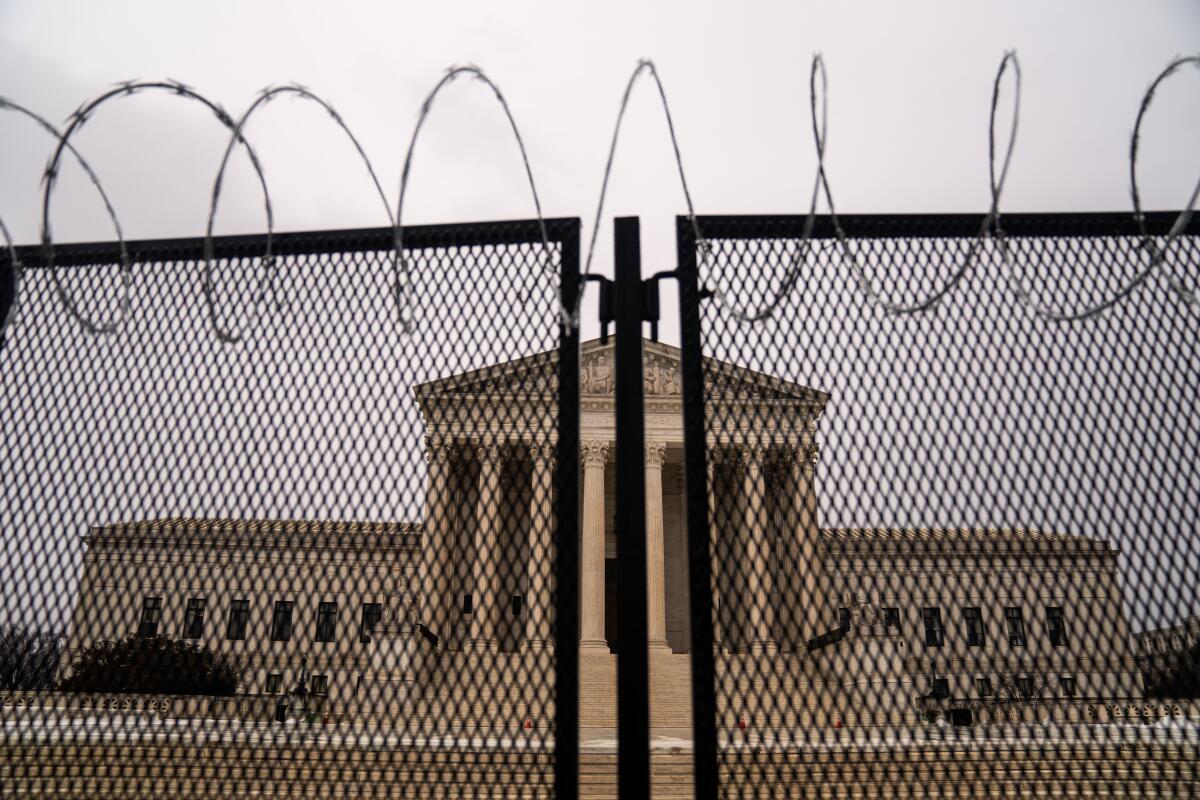The Supreme Court won’t secure voting rights. It’s up to Congress

- Share via
After oral arguments in a pair of voting rights cases Tuesday, Supreme Court watchers predict that the justices will uphold two laws that make it harder for Arizonans to get their votes counted. The question is the precise legal standard that the justices will set.
Whatever that standard, the court’s lean toward voter restrictions only adds to conservative tactics that are putting American democracy at risk. Upholding the Arizona laws — one disqualifies ballots cast other than in the voters’ precinct; the other prohibits most third parties from collecting and delivering mail-in/drop-off ballots — will lay the groundwork for more states whose politicians are eager to push the disenfranchisement of voters, especially minority voters, to the legal limit.
The overall stakes are enormous. Since the election, Republican-controlled state legislatures, many of them led by Trump loyalists who continue to falsely maintain that the 2020 presidential election was stolen, have initiated an avalanche of legislation that will make it harder to cast ballots. They are seeking to curtail the time period for early voting, for example, or to cut down on the number and accessibility of ballot drop boxes. They want to do away with automatic voter registration and prevent online registration.
These kinds of rules, the best data show, impose particular burdens on minority voters. In the Arizona cases, for example, making it illegal for third parties to collect and deliver ballots has a disproportionate effect on Native Americans, many of whom live in remote rural areas far from voting centers and even post offices.
There’s no real doubt about what’s driving these laws. Attorney Michael Carvin, arguing for the Arizona restrictions, candidly admitted the rationale on Tuesday. His client, the Arizona Republican Party wanted to keep restrictions in place because to do otherwise would put the GOP “at a competitive disadvantage relative to Democrats.”
“Politics,” Carvin continued, “is a zero-sum game, and every extra vote they get through unlawful interpretations of [the law] hurts us.”
The Republican Party, which has won the popular vote in just one of the last eight presidential elections, knows it must depend on distortions to the one-person, one-vote principle to hold on to power. Rather than tack to the center to win back a majority, as normal electoral politics would dictate, the GOP is looking to voter suppression, especially among Democratic-leaning minorities, to keep it in proximity to power.
There is an important back story to the current Supreme Court cases. The Voting Rights Act of 1965 sharply constrained certain jurisdictions with a history of discrimination from enacting changes to election procedures that could disproportionately burden minority voters. Congress repeatedly reauthorized those provisions, which required voting regulations to go through pre-clearance by judges. That all changed in 2013, when the Supreme Court struck down the pre-clearance requirement, saying that the country’s progress in reducing barriers to minority voters made it no longer necessary. They were wrong. Jurisdictions that previously had been subject to the pre-clearance requirement quickly adopted new restrictive voting laws.
Since 2013, the most potent remaining provision of the Voting Rights Act has been Section 2, which forbids any voting procedure that “results” in a denial or abridgment of the right of any citizen to vote on account of race. Unlike the pre-clearance provision, Section 2 puts the burden on plaintiffs to show a racially disparate impact. That means suing after the fact, when the damage has been done, and persuading the court the harm done meets a particular threshold.
What threshold exactly? That’s what the Supreme Court will decide in the Arizona cases. The questioning during the oral arguments suggested that Chief Justice John G. Roberts Jr., Justice Brett M. Kavanaugh and Justice Amy Coney Barrett were looking for some not-too-strict, not-too-lenient standard.
It’s fair to ask why the court would allow any disproportionate impact to minority votes under a law that prohibits abridgement of the right to vote on account of race. The answer Tuesday seemed to be to permit states running room to prevent putative voter fraud before it happens. As Justice Neil M. Gorsuch put it, “Does Arizona have to wait for fraud to occur in Arizona using a practice before it can outlaw it?”
The sensible answer to that question is yes. Despite what right-wingers and especially Trump loyalists say, the evidence of voter fraud in Arizona or in any other state is scanty and anecdotal. When the court upended pre-clearance, it cited its own assessment of facts on the ground to justify overturning the will of Congress. However, with Section 2, it looks as if it will permit conjecture about potential fraud, and implausible conjecture at that, to authorize disproportionate impact to minority votes and to let Arizona’s restrictions stand.
The best remedy is for Congress to address voting rights again. HR 1, the For the People Act, is a package of provisions that would overturn a passel of voter suppression tactics. It has passed the House, and Democrats have the votes to pass it into law, but only if they are willing to alter the filibuster, which in effect requires 60 votes in the Senate to move legislation forward.
Certainly, the Democrats should negotiate first, but if reforming the filibuster is the only avenue to reimpose robust legal protections for one-person, one-vote principles and for the requirement of equal treatment of all voters regardless of race, they shouldn’t hesitate. Attacking a Senate tradition is an extreme move, but it’s fitting to let the words of an old-school Arizona Republican apply: “Extremism in defense of liberty is no vice.”
@HarryLitman
More to Read
A cure for the common opinion
Get thought-provoking perspectives with our weekly newsletter.
You may occasionally receive promotional content from the Los Angeles Times.









